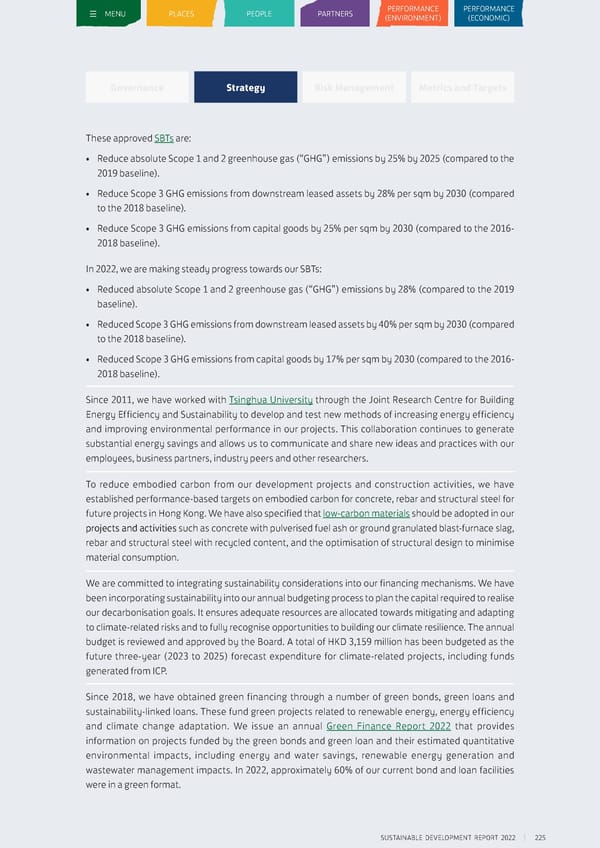MENU PLACES PEOPLE PARTNERS PERFORMANCE PERFORMANCE (ENVIRONMENT) (ECONOMIC) Governance Strategy Risk Management Metrics and Targets These approved SBTs are: • Reduce absolute Scope 1 and 2 greenhouse gas (“GHG”) emissions by 25% by 2025 (compared to the 2019 baseline). • Reduce Scope 3 GHG emissions from downstream leased assets by 28% per sqm by 2030 (compared to the 2018 baseline). • Reduce Scope 3 GHG emissions from capital goods by 25% per sqm by 2030 (compared to the 2016- 2018 baseline). In 2022, we are making steady progress towards our SBTs: • Reduced absolute Scope 1 and 2 greenhouse gas (“GHG”) emissions by 28% (compared to the 2019 baseline). • Reduced Scope 3 GHG emissions from downstream leased assets by 40% per sqm by 2030 (compared to the 2018 baseline). • Reduced Scope 3 GHG emissions from capital goods by 17% per sqm by 2030 (compared to the 2016- 2018 baseline). Since 2011, we have worked with Tsinghua University through the Joint Research Centre for Building Energy Efficiency and Sustainability to develop and test new methods of increasing energy efficiency and improving environmental performance in our projects. This collaboration continues to generate substantial energy savings and allows us to communicate and share new ideas and practices with our employees, business partners, industry peers and other researchers. To reduce embodied carbon from our development projects and construction activities, we have established performance-based targets on embodied carbon for concrete, rebar and structural steel for future projects in Hong Kong. We have also specified that low-carbon materials should be adopted in our projects and activities such as concrete with pulverised fuel ash or ground granulated blast-furnace slag, rebar and structural steel with recycled content, and the optimisation of structural design to minimise material consumption. We are committed to integrating sustainability considerations into our financing mechanisms. We have been incorporating sustainability into our annual budgeting process to plan the capital required to realise our decarbonisation goals. It ensures adequate resources are allocated towards mitigating and adapting to climate-related risks and to fully recognise opportunities to building our climate resilience. The annual budget is reviewed and approved by the Board. A total of HKD 3,159 million has been budgeted as the future three-year (2023 to 2025) forecast expenditure for climate-related projects, including funds generated from ICP. Since 2018, we have obtained green financing through a number of green bonds, green loans and sustainability-linked loans. These fund green projects related to renewable energy, energy efficiency and climate change adaptation. We issue an annual Green Finance Report 2022 that provides information on projects funded by the green bonds and green loan and their estimated quantitative environmental impacts, including energy and water savings, renewable energy generation and wastewater management impacts. In 2022, approximately 60% of our current bond and loan facilities were in a green format. SUSTAINABLE DEVELOPMENT REPORT 2022 225
 Sustainable Development Report 2022 Page 225 Page 227
Sustainable Development Report 2022 Page 225 Page 227